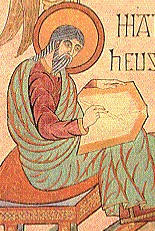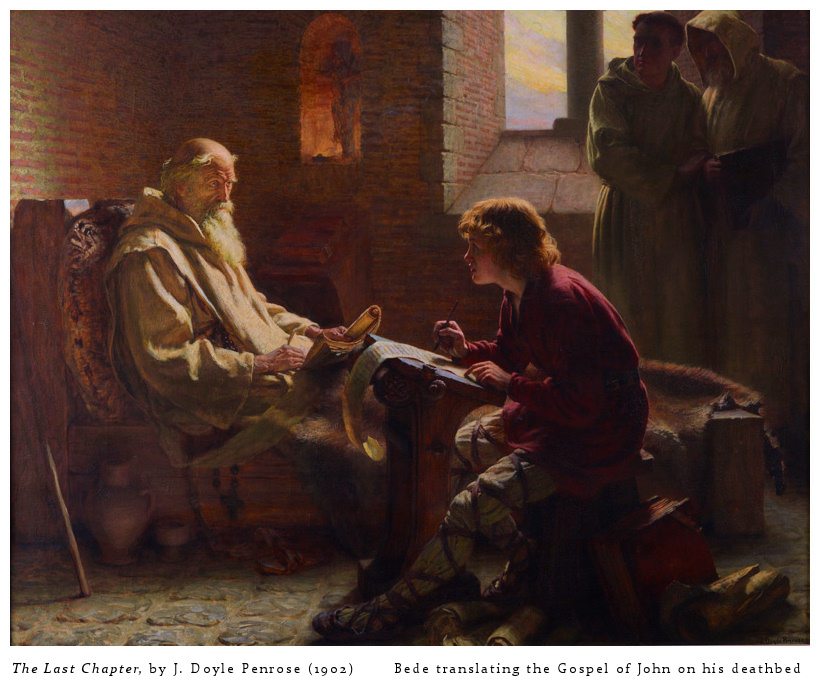
Detail from the title page of
Matthew in the Lindisfarne
Gospels
| Bible Research > English Versions > Anglo-Saxon > History |

The story of the English Bible falls naturally into four periods corresponding to changes in the English language. The first period runs from about A.D. 600 to 1150, in which the language had the form known as Anglo-Saxon or Old English. The second period runs from 1150 to 1450, in which we may speak of Middle English. The third period is from about 1450 to 1750, called Early Modern English; and after 1750 we have simply Modern English, the language that we speak today. The reader may get an idea of the amount of change in the English language by viewing a Bible passage in Old English, Middle English and Early Modern English in parallel columns here.
The first two periods of our language — Old and Middle English — fall within the Medieval period of European history, during which there are few examples of Bible versions. The idea of a vernacular Scripture is indeed ancient, and several versions were made in the ancient times; but during the middle ages the Roman Catholic church discouraged further translations into the common languages of Europe. It was not until the power of Rome was broken in the sixteenth century that versions in English became widely available and used. Nevertheless there were some versions made in the medieval times, and their story is an instructive prelude to the great period of translation that began 500 years ago.
Our story begins with the beginning of the church in pre-English Britain. In the middle of the first century A.D. (43), Roman legions invaded and quickly subdued Britain. At that time the land was populated by the primitive people called Celts. As Christianity spread throughout the Roman Empire during the third century, many of these Celts were converted, even among the Scots in northern Ireland. But the early Celtic Christians disappeared from most of Britain after the Roman legions withdrew in the middle of the fifth century (440). A long series of Teutonic invasions and migrations was at that time reshaping the ethnic map of Europe and pressing hard upon the Roman Empire, and the Romans withdrew from Britain in order to consolidate their strength in Italy. Shortly after the departure of the Romans, Britain was invaded by enterprising Angles and Saxons from northern Europe. During the sixth century these Germanic invaders drove the native Celts out and established themselves in the part of Britain which is now called England (“Angle-land”). Historians refer to these new inhabitants of the land as “Anglo-Saxons.”
During the seventh century the Anglo-Saxons were converted to Christianity by the efforts of two different groups of missionaries, which resulted in two different forms of Christianity in England. The one mission, sent from Rome, aimed at bringing the politically important southern part of England under the influence of the Pope. The other mission was carried out by Scots from Ireland, where the early Celtic church had survived the Anglo-Saxon invasion. These Scots evangelized all of central and northern England, without the support of Rome. It was in the northern part of England that a first attempt to present any part of the Bible in Anglo-Saxon was made. An illiterate herdsman named Cædmon, after hearing some Bible stories from the Celtic teachers at Whitby, turned some of the stories into poetic songs in his own language. This was about the year 670. From the eighth century we have an account of “the Venerable” Bede (a learned teacher at Jarrow, also in the north) translating the Gospel of John into Old English on his deathbed (735). This version has disappeared without a trace. There is no evidence of any version made in the south of England during this period.
At the beginning of the ninth century, the northern and eastern parts of England were invaded by another Germanic people called the Danes or Northmen. They were a heathen people, and did much harm to the monasteries where the Scriptures were copied. Nevertheless, from this period we have an historically important manuscript known as the Vespasian Psalter, which was written in the central part of England called Mercia. It contains an interlinear Old English translation of the Psalms. The Danes were at that time advancing through Mercia, but towards the end of the ninth century the Anglo-Saxon armies finally stopped them, and held on to the south and west under the strong leadership of King Alfred. Alfred also became a champion of the Scriptures. Around the year 900 he prefixed to his code of laws a translation of the ten commandments and some other portions of Exodus; and he is also reported to have begun a version of the Psalms. Many scholars believe that the first fifty Psalms of the so-called “Paris Psalter” are a copy of his work. If this version is the work of Alfred, it is our earliest example of a version done in the south; and yet it should be noted that the purported translator was a layman, and one who was above the power of the Romanizing southern bishops.
During the tenth century Alfred’s successors managed to dominate the new population of Danes, and, because the culture and language of the Danes was similar to that of the Anglo-Saxons, the newcomers were gradually absorbed into the population of the northeast and Christianized. About the year 950 the Northumbrian Gloss on the Gospels (an interlinear Old English translation, in the northern dialect) was added to the famous illuminated manuscript known as the Lindisfarne Gospels. Shortly after this a priest of Yorkshire (northern England) named Farman interlined another Latin manuscript known as the Rushworth Gospels.
At the end of the tenth century the Danes attacked England again. This time however the Danish King, Sven, aimed merely to establish himself as an overlord, without destroying the native Anglo-Saxon nobility or filling the land with his countrymen. The English King, Ethelred, was unwilling to do battle against Sven, and so twice he payed Sven large sums of money to withdraw from the land. Eventually he fled to Normandy to take refuge with his wife’s family. Sven became King of England, and he was succeeded by his son Canute. During this period there took place some very significant developments in the English church. The priests began to marry, and the cloistered ascetic culture of monasticism generally declined even in the south. There appeared in the south an anonymous version of the four Gospels in Old English, known as the West-Saxon Gospels or Wessex Gospels. This version evidently had some currency in England, because seven copies of it have come down to us. Also at this time a scholarly priest named Ælfric in Dorsetshire was translating a number of commentaries into English, and at the request of a local nobleman Ælfric went on to produce an abridged English version of the Pentateuch. Ælfric was aware of the fact that such translation of Scripture was frowned upon in the past, and he several times expresses reservations about it in his works, yet he continued. It may also be noted that in his writings he disgreed with the Roman teaching about the “immaculate conception” of Mary, and the “transubstantiation” of the bread in the Roman mass.
Here is the Old English version of the Lord’s Prayer (Matthew 6:9-13), as given in the West Saxon Gospels.
| Fæder ure þu þe eart on heofonum, Si þin nama gehalgod. to becume þin rice, gewurþe ðin willa, on eorðan swa swa on heofonum. urne gedæghwamlican hlaf syle us todæg, and forgyf us ure gyltas, swa swa we forgyfað urum gyltendum. and ne gelæd þu us on costnunge, ac alys us of yfele. soþlice. |
When Canute died, Ethelred’s son Edward came from Normandy to be King. Because he had been raised in Normandy by a Norman mother, he was thoroughly French in culture and connections, and he appointed many Normans to offices in England. He was also very much under the influence of Rome (which tightly controlled the French churches), and so he appointed many Norman clerics to lucrative and powerful secular offices. Acting on behalf of the Pope he also appointed a suitably loyal Norman to be the Archbishop. In this however, he was ardently opposed by the powerful earls in England, who drove out the Norman archbishop and put in his place an Englishman. The Pope, being incensed at this “schismatic” action, excommunicated the English archbishop, and gave his support to the Duke of Normandy’s plans for an invasion of England.
The story of the attempts of the Anglo-Saxons to produce an Old English version of the Bible comes to a sad end when the Norman army under William the Conqueror invaded and subdued England in the year 1066. William brought with him a new French-speaking ruling class, and a Norman French clergy, who had only contempt and hostility for the fledgling Old English versions. The Normans quickly set up a church organization which was utterly inimical to the vernacular English versions, and which served to promote the political interests of the ruling class and of the Pope.

| Bible Research > English Versions > Anglo-Saxon > History |